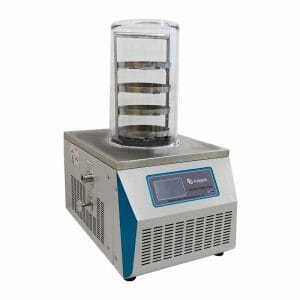Freeze-drying is an equipment that works by making use of drying by vacuum freezing. The freeze-drying process, which is nothing more than an advanced dehydration procedure, removes all traces of water and moisture from the product and sublimes the ice, thanks to the low pressure to which it is subjected. Due to their incredible drying capacity, freeze-dried materials have a higher quality and benefits than dehydrated products through other processes.
The freeze-drier has the main characteristic of operating at low temperatures, making that, for example, volatile products are not lost, this being contrary in a traditional drying process. By sublimation the solid state is passed directly to gas, ignoring the liquid state, making the obtained product porous and can be rehydrated and recover its properties easily.
Freeze-drying is a method used in the food industry, pharmacology and archeology. It allows dehydrating materials by a non-denaturing process and removes up to 99% moisture from them. Some products that can be lyophilized are fruits, coffee, flowers, and drugs, as well as archeological objects, among others. Archeological products are made of dead vegetable fibers or wood, when exposed to an inappropriate environment, biological and chemical processes will cause the complete disappearance of these, however, in means of extreme dryness, due to the absence of water, decomposition is slow. For this reason, lyophilization was used for archeological wood.
Freeze-dried archeological pieces
Freeze-drying is a method of drying a product previously frozen under vacuum. The lyophilizer removes the water contained in the organic material, sublimating it, that is, making it pass from solid to vapor. Freeze-drying has 3 essential stages: the freezing stage, the primary drying stage, and finally the secondary drying stage.
This process is becoming more common in industries as a method of conservation of organic matter. In archeology, especially underwater, it is very useful, since it allows us to extract water from archeological resources and know the history of them. For example, by freeze-drying wooden archeological objects, the water in them becomes ice, and then sublimates, after being subjected to the vacuum. This process allows objects to have a stable equilibrium and can be preserved in the middle.
Freeze drinkers
The freeze-drier is a machine in charge of dehydrating, by freezing drying, a given product, this action is known as freeze-drying or dehydrofreezing. This process is booming within the food, pharmaceutical and archeological industry because it allows to maintain the original structure of the materials. The lyophilization process is completed in 3 key stages:
- The freezing stage, one of the most critical and important, the product must be completely frozen, otherwise it can be damaged by being in a vacuum environment.
- The primary drying stage, this phase is very durable because 90% of the physical water present in the material has to be removed, reducing the pressure and applying heat gradually to the frozen material.
- The secondary drying stage is the stage where the greatest vacuum is required and all the water that is attached to the material is removed.
Kalstein brand lyophilizers
At Kalstein we are the leading MANUFACTURERS of the best laboratory equipment useful in the field of science and medicine. We have a wide variety of models at the best PRICES in the market. If you are interested in making the PURCHASE of any of our lyophilizers, we have desktop and vertical lyophilizers, our normal laboratory YR series desktop lyophilizer is characterized by: HERE
- CFC-free cooling.
- LCD drying curves, English interface.
- Large capacitor aperture, capacitor with pre-freeze function.
- Low noise compressor, good efficiency, long service life.
To make your PURCHASE, just enter our catalog and ask for the quote of the desired product HERE


